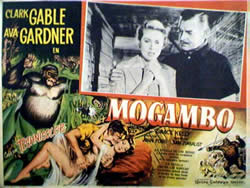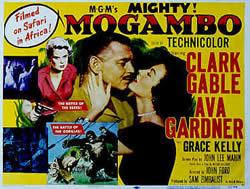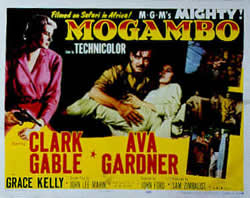|
MOGAMBO
Abstract:
Victor Marswell (Clark Gable) is an African guide involved with two
women: the sensuous, easygoing Eloise (Ava Gardner), and the glacial
Linda (Grace Kelly), his employer's wife. Spectacular African landscapes
provide the backdrop for this melodramatic John Ford film.
Summary:
 It
is probable that the considerable success of KING SOLOMON'S MINES in
1950 prompted M-G-M to make MOGAMBO several years later. Once again,
the film utilizes extensive African locations, but unlike the earlier
adaptation of H. Rider Haggard's classic novel, MOGAMBO is not essentially
an African adventure story. The source is a play, set on a tropical
rubber plantation, which the same studio had used in 1932 to make RED
DUST. The story remains superficially the same, with many picturesque
African details added. John Lee Mahin, who had written the screenplay
for RED DUST, also wrote MOGAMBO, but there is nothing stale about this
fine writer's work on the film since each of the characters is subtly
altered. The same star, Clark Gable, once again plays the hero; he gives
the impression of being even more tough and virile than when he was
a much younger man, and also provides the sensitivity and depth which
many actors acquire as they grow older and more experienced. The role
of the woman of the world originally played by Jean Harlow is reinterpreted
by Ava Gardner, while Grace Kelly replaces Mary Astor in the role of
the respectable married woman. Crucially, John Ford directed MOGAMBO,
and although the material is not that which he usually favors, he handles
it with characteristic mastery, and the result is a film far more vivid
and moving than RED DUST. It
is probable that the considerable success of KING SOLOMON'S MINES in
1950 prompted M-G-M to make MOGAMBO several years later. Once again,
the film utilizes extensive African locations, but unlike the earlier
adaptation of H. Rider Haggard's classic novel, MOGAMBO is not essentially
an African adventure story. The source is a play, set on a tropical
rubber plantation, which the same studio had used in 1932 to make RED
DUST. The story remains superficially the same, with many picturesque
African details added. John Lee Mahin, who had written the screenplay
for RED DUST, also wrote MOGAMBO, but there is nothing stale about this
fine writer's work on the film since each of the characters is subtly
altered. The same star, Clark Gable, once again plays the hero; he gives
the impression of being even more tough and virile than when he was
a much younger man, and also provides the sensitivity and depth which
many actors acquire as they grow older and more experienced. The role
of the woman of the world originally played by Jean Harlow is reinterpreted
by Ava Gardner, while Grace Kelly replaces Mary Astor in the role of
the respectable married woman. Crucially, John Ford directed MOGAMBO,
and although the material is not that which he usually favors, he handles
it with characteristic mastery, and the result is a film far more vivid
and moving than RED DUST.
The story divides into two sections, the first involving the affair
between Victor Marswell (Clark Gable) and Eloise Y. Kelly (Ava Gardner)
and the second involving Vic's infatuation with Linda Nordley (Grace
Kelly), the wife of a scientist, Donald Nordley (Donald Sinden), for
whom Vic is serving as a guide. In the first section, there is virtually
no melodramatic plot development; Kelly is heading downriver and circumstances
force her to stay with Vic. In spite of her warm humor, great beauty,
and honest affection, Vic does not take her seriously this early in
the film. For him, her apparently loose morals disqualify her as a permanent
partner, and he considers the affair to be nothing more than a pleasant
interlude for both of them. When the Nordleys arrive, the polished manners
and feminine vulnerability of Linda make an immediate impression on
Vic. Kelly remains, but Vic treats her with little regard. Although
she is deeply in love with him, she must watch with mock good spirits
as he becomes increasingly drawn to Linda, who finally responds. Vic
ultimately realizes that he is a fool, and he and Kelly cleverly conceal
his relationship with Linda from her husband after the hysterical Linda
has shot and wounded Vic in a fit of anger. Although this section of
the film is melodramatic, it does not present a classic triangle. Kelly
gives the appearance of being sporting about Vic's troubled love for
Linda, and her character is looked at independently from the main thrust
of the narrative, which appears to center on Vic and Linda.
 What
is so interesting about Ford's interpretation of this story is that
it reveals something very unexpected about his attitude toward women.
The prim Linda would seem to be a type of woman not too remote from
many of his heroines, and he might be expected to show her greater sympathy
than Kelly. Instead, he favors Kelly throughout, admiring her independence
and perceiving that her waywardness leaves her fundamentally moral character
untouched. Whereas Linda eventually becomes a victim of her passions,
Kelly is shown to be self-reliant throughout and to have an understanding
of her actions. In one of the best scenes in the film, Kelly approaches
a priest whose confessional is rather primitive. As Kelly begins her
confession, the priest lets down a bamboo curtain to separate them.
The scene reveals Kelly to be a Catholic, as much in harmony with her
surroundings as the priest is, and to be in touch with her spiritual
values far from the civilization which has superficially corrupted her. What
is so interesting about Ford's interpretation of this story is that
it reveals something very unexpected about his attitude toward women.
The prim Linda would seem to be a type of woman not too remote from
many of his heroines, and he might be expected to show her greater sympathy
than Kelly. Instead, he favors Kelly throughout, admiring her independence
and perceiving that her waywardness leaves her fundamentally moral character
untouched. Whereas Linda eventually becomes a victim of her passions,
Kelly is shown to be self-reliant throughout and to have an understanding
of her actions. In one of the best scenes in the film, Kelly approaches
a priest whose confessional is rather primitive. As Kelly begins her
confession, the priest lets down a bamboo curtain to separate them.
The scene reveals Kelly to be a Catholic, as much in harmony with her
surroundings as the priest is, and to be in touch with her spiritual
values far from the civilization which has superficially corrupted her.
The first section of the film, in which Kelly is at the center of the
action, is directed in a relaxed and charming manner. Ford captures
on film Ava Gardner's free and easy rapport with the animals, and also
conveys his quiet certainty that she is the perfect woman for Vic. When
the second section begins and the Nordleys arrive, the director sometimes
seems impatient with the melodrama of scenes involving Vic and Linda
but finds plenty of opportunities for more humor and for adding incidental
touches to Kelly's character. To Ford's credit, however, the love scenes
between Vic and Linda are romantically intense and charged with a feeling
of sexual abandon.
Throughout MOGAMBO, Ford takes advantage of the locations in Kenya,
Tanganyika, Uganda, French Equatorial Africa, and the Belgian Congo
to create a pictorially appealing view of Africa that is filled with
near-documentary moments which, without intruding on the story, reveal
native customs, details of animal life, and the physical character of
African landscapes. Fortunately Ford blends the natural beauty of Africa
with the personal beauty of the two leading ladies. Grace Kelly was
in the process of becoming a star when she made MOGAMBO, and the film
clearly contributed to her image, which appealed to Alfred Hitchcock.
Immediately after MOGAMBO Hitchcock used Grace Kelly for three films,
casting the actress as the archetype of a woman whose beauty is cold
on the surface but whose reserve conceals a sexuality which is unrestrained
once expressed. Her character as Linda was ideal to project this archetype
because she was morally forbidden to the hero as an object of love.
His love for her must be understood as a flaw in his character, as it
is her remoteness and inaccessibility which attract him. He is a man
whose emotional responses are not truly adult until he is able to respond
to a woman whose feelings are freely given.
 Vic's
preference for Linda over Kelly is barely overcome by his rationale,
however, since it remains difficult to accept even temporarily the rejection
of a woman as consummately sensual and sympathetic as Ava Gardner. It
is clear from his direction that Ford found Ava Gardner enchanting,
and this may partly explain why Kelly stands out as the most endearing
character. Cast as a goddess in all her films during this period, Gardner
has never been so natural, witty, and entertaining to watch as in MOGAMBO.
In the relatively few moments in which the character is able to express
her emotions directly, Gardner shows a dramatic skill for which she
is almost never given credit, although it has graced a number of memorable
films, notably BHOWANI JUNCTION (1956), THE BAREFOOT CONTESSA (1954),
SHOW BOAT (1951), THE KILLERS (1946), THE SNOWS OF KILIMANJARO (1952),
and PANDORA AND THE FLYING DUTCHMAN (1951). For her performance in MOGAMBO
she received her only Academy Award nomination. Vic's
preference for Linda over Kelly is barely overcome by his rationale,
however, since it remains difficult to accept even temporarily the rejection
of a woman as consummately sensual and sympathetic as Ava Gardner. It
is clear from his direction that Ford found Ava Gardner enchanting,
and this may partly explain why Kelly stands out as the most endearing
character. Cast as a goddess in all her films during this period, Gardner
has never been so natural, witty, and entertaining to watch as in MOGAMBO.
In the relatively few moments in which the character is able to express
her emotions directly, Gardner shows a dramatic skill for which she
is almost never given credit, although it has graced a number of memorable
films, notably BHOWANI JUNCTION (1956), THE BAREFOOT CONTESSA (1954),
SHOW BOAT (1951), THE KILLERS (1946), THE SNOWS OF KILIMANJARO (1952),
and PANDORA AND THE FLYING DUTCHMAN (1951). For her performance in MOGAMBO
she received her only Academy Award nomination.
In a touching conclusion, after the Nordleys have departed and Kelly
herself is about to leave, Vic realizes that she is his true romantic
partner. She is at the river and Ford composes a characteristically
beautiful long shot which finds Vic going to her and embracing her.
Where other directors would feel the need to cut to a close-up, Ford
is visually subtle about this happy ending, and he allows the audience
to respond to the resolution of the relationship without intruding on
the intimacy of the two characters, thus providing the intimacy with
even greater magic. The burnished orange glow of the African sky and
the subdued chanting of the natives on the soundtrack contribute to
making this final scene both lovely and poignant.
Release Date: 1953
Production Line:
Sam Zimbalist for Metro-Goldwyn-Mayer
Director: John Ford
Cinematographer: Robert Surtees and Freddie A. Young
File Editor: Frank Clarke
Run Time: 115 minutes
Cast:
Victor Marswell - Clark Gable
Eloise Y. Kelly - Ava Gardner
Linda Nordley - Grace Kelly
Donald Nordley - Donald Sinden
John Brown-Pryce - Philip Stainton
Leon Boltchak - Eric Pohlman
Skipper - Laurence Naismith
Father Josef - Denis O'Dea
Studios named in Production Credits:
Metro-Goldwyn-Mayer
Screenplay (Author):
John Lee Mahin
Wilson Collison
Award Citations:
Academy Awards - Nomination - Best Actress - Ava Gardner
Academy Awards - Nomination - Best Supporting Actress - Grace Kelly
Golden Globe Award - Winner - Best Supporting Actress - Grace Kelly
Notes:
MOGAMBO is a remake of the 1932 RED DUST, which also starred Clark Gable.
The story also served as the basis for the film CONGO MAISIE (1942).
|
![]()
![]()